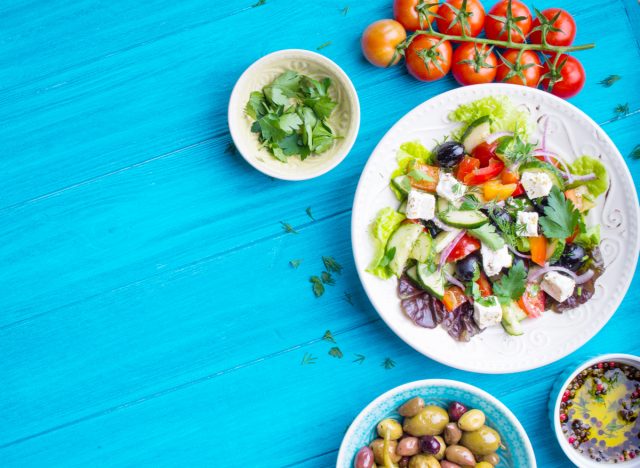Let’s agree—menopause is no joke. After decades of dealing with a regular period and the cramps, mood swings, and pain that come with it, people with uteruses also have to endure the hot flashes, irritability, lack of sleep, and even the potential depression that comes with menopause.
This event, which marks your body’s final menstrual period and usually occurs between the ages of 45 and 55, causes a significant change in people’s hormones. Because of this, it can easily lead to weight gain and/or a more difficult time losing weight. Not only that but the time before menopause, known as perimenopause, is also known to contribute to unwanted weight gain as well.
To help with this experience, Mary Claire Haver, MD created the Galveston Diet for those who want to stop weight gain before menopause. This diet is a way of eating that includes plenty of whole foods and is focused on reducing inflammation.
Read on to learn more about how this eating pattern may help prevent weight gain before menopause, and for more healthy eating tips check out The #1 Best Supplement for Women Over 50.
What is the Galveston Diet?

The main purpose of the Galveston Diet is to help people in perimenopause manage their weight and avoid the common occurrence of weight gain associated with this stage. But more than just focusing on weight management, the Galveston Diet is also intended to help regulate hormones and improve symptoms associated with menopause.
The diet is structured around three pillars: anti-inflammatory foods, intermittent fasting, and what is known as a “fuel refocus,” which means limiting your consumption of refined carbs and focusing more on nutrient-dense carbohydrates.
“This diet encourages eating foods low in carbohydrates, lean protein, healthy fats, and a select group of low starch produce,” says Trista Best, MPH, RD, LD at Balance One Supplements, “as well as integrating three supplements: vitamin D, fiber, and omega-3 fatty acids.”
Aside from the element of intermittent fasting, this eating pattern most closely resembles the popular Mediterranean Diet, which pulls inspiration from places like Italy, Greece, Spain, and France.
How the Galveston Diet may help you avoid weight gain.
This is a fairly new diet, so there isn’t much research to be found on it. To learn more about the possible benefits, we asked a few of our expert dietitians to weigh in.
Overall, dietitians agree that eating anti-inflammatory foods is a good step towards preventing weight gain before menopause.
“Data shows a link between chronic inflammation and weight gain, so eating anti-inflammatory foods is a great practice when trying to avoid weight gain, regardless of which stage of the life cycle you are in,” says Lauren Manaker, MS, RDN, author of The First Time Mom’s Pregnancy Cookbook and Fueling Male Fertility, and registered dietitian on our medical expert board.
The “fuel refocus” part of the diet—eating more whole foods and limiting your consumption of processed foods—can also help you manage your weight at this life stage.
“Limiting foods that are pro-inflammatory, which includes many ultra-processed foods, can help people manage their inflammation and potentially help them lose weight” says Manaker.
The intermittent fasting pillar of the diet may not be for you.
While eating anti-inflammatory foods and limiting your consumption of pro-inflammatory foods is helpful to most, some dietitians warn that intermittent fasting isn’t for everyone.
“To be honest, there is nothing magical about intermittent fasting that will promote health and weight loss in this population so I’d skip that part,” says Lisa Young, Ph.D., RDN, author of Finally Full, Finally Slim and member of our medical expert advisory board. “Limiting late-night eating is a great idea, but limiting your eating window can possibly set you up for a cycle of restriction and then overeating.”
Should you try the Galveston Diet?
Most information you can find about the diet is from books and online subscription resources. For specific information about the diet, you can purchase Dr. Haver’s book, The Galveston Diet: The Doctor-Developed, Patient-Proven Plan to Burn Fat and Tame Your Hormonal Symptoms.
For more structured guidance, you can access the official Galveston Diet program online, which is offered in three levels: signature ($59), Gold ($99), and Platinum ($229), each with varying degrees of information provided.
While there is some research that supports the Galveston Diet’s method of preventing weight gain before menopause, because the diet is relatively new there is currently no concrete evidence besides customer testimonials to verify its success. Our dietitians are supportive of two of the three pillars—eating anti-inflammatory foods and the “fuel refocus”—but do not recommend intermittent fasting.
If you want to learn more, talk with your doctor or dietitian about how something like the Galveston Diet may affect you and your health goals.

